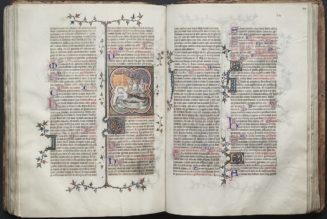 |
As I write, there is no customary and comforting glass of bourbon at my side. There’s no refreshing gin and tonic; no hearty glass of craft ale. It is Lent and all such blessings have been set aside. And yet, even in the desert, Holy Mother Church leads us to the occasional oasis, a place to feast in the midst of fasting. One such oasis is the Feast of Saint Patrick, the one day in the year when even a dyed-in-the-wool Englishman can rediscover the closeted Celt lurking deep inside him. In my case, it’s the ghost of my Irish grandmother, a Kavanaugh from Galway, or, at a pinch, it’s my Irish mother-in-law from Tyrone.
It was in this spirit of rekindled wannabe Irishness that I found myself browsing through Drinking with Your Patron Saints by Michael P. Foley (Regnery, 2020), a companion volume to his two previous titles of a similar ilk: Drinking with the Saints and Drinking with Saint Nick. Something of the rambunctious spirit (pun intended!) which fills these pages is evident right at the beginning of Part One when Mr. Foley tells us that some of his suggestions “are to be taken with a grain of salt and a shot of tequila.” This is indeed the spirit with which a book of this sort should be both written and read, suggestive of that “boozy halo” with which the killjoy H. G. Wells accused Belloc and Chesterton of surrounding Catholicism. It is the halo of healthy conviviality that surrounds both the spirits in the glass and the spirits of those imbibing them.
Part Two of the book is a litany of patron saints, listed alphabetically from “Adam to Zita.” I was intrigued to see old man Adam listed in first place among the saints. Reading on, I discovered that his feast day in the Byzantine calendar is December 24, a symbolically apt date signifying Adam’s prefiguring of the New Adam who will be born on the following day. Although Adam has never been officially recognized as a saint by the Western Church, Mr. Foley reminds us that, “according to tradition, both Adam and Eve felt really, really bad about the whole Fall of Man business and spent the rest of their years—or rather centuries—doing penance.” We should see them, in this context, as magnified and magnanimous Magdalen figures, the archetypes of all penitents, ourselves included. We might even wish to see them as the patron saints of Lent itself. This fanciful suggestion aside, Mr. Foley tells us that Adam is in fact the patron saint of gardeners and horticulturalists, adding, in a fit of fanciful suggestion of his own, that he should also be the patron saint of “massive screw-ups.” The drink that Mr. Foley suggests that we drink with Adam, or at least with Adam in mind, is a concoction called Adam’s Apple, a seductive combination of apple brandy, gin, dry vermouth, and green chartreuse, which sounds good enough to tempt the devil himself to enjoy the “good things our Christendom brings” (to quote from a drinking song by Hilaire Belloc).
Browsing through this alphabetical litany of saints en route, as if on a pilgrimage, to Saint Patrick, I come across the entry for Brigid, that other great Irish saint. Apart from discovering that she is patroness of milkmaids, chicken farmers, and babies, I also discovered to my delight that she is the patron saint of brewers. The reason, apparently, is that she composed a prayer called “The Lake of Beer,” which Mr. Foley calls “beautiful,” in which the saint expresses her desire to give “a great lake of beer” to the King of Kings and that she’d like the angels to drink from it eternally, as well as the saints, whom she invites to her house, hoping for “cheerfulness to be their drinking” and that they should have “barrels of peace at their disposal.” Now that’s a party to which I’d like to be invited!
Stumbling upon the entry for Saint Francis de Sales, patron saint of writers, I stifled the resentful thought that Saint Robert Southwell, my own adopted patron, is a writer saint (and martyr) who is always overlooked. A major influence on Shakespeare and other poets, including Hopkins, and a major metaphysical poet in his own right, he has a claim to literary preeminence amongst saints that few, including Francis de Sales, can challenge. All such thoughts are laid aside, however, as I stagger upon Mr. Foley’s choice of beverage to honor the patron saint of writers. It is the cocktail of cocktails: “Walker Percy’s Perfect Mint Julep.” As I am reminded of the ingredients (bourbon, sugar, sprigs of mint, crushed ice, and grated nutmeg), I am also reminded of a time when a friend (who served with me on the literature faculty at a Catholic college) made me this very same “perfect” cocktail. My mouth waters at the memory!
Fumbling through the pages, I come across the entry for Saint Jude, patron saint of desperate or hopeless cases, and find myself appalled at the ingredients for the appropriately named Desperado #1 which consists of beer mixed with tequila and lime. No thanks! I would have to be truly desperate and in need of Saint Jude’s intercession were I ever to desire something as dire as this concoction to kiss my lips. Thankfully, Mr. Foley offers an alternative, the unimaginatively named Desperado #2, which contains tequila, sweet vermouth, amontillado sherry, Cynar, and an orange twist for garnish. An altogether more enticing prospect!
Finally, after taking my leave of one carousing saint after another, I find myself in the presence of Saint Patrick himself.
In Mr. Foley’s customary manner, we are treated to an anecdotal introduction to the saint, learning things we already knew, such as Saint Patrick’s purging Ireland of its snakes, but also things that we might not know, such as the fact that Saint Patrick is also the patron saint of Nigeria (Kiss me, I’m Nigerian!). We also learn of a legend surrounding Saint Patrick, which I shan’t recount, that leads Mr. Foley to suggest that Ireland’s saint should also be the patron saint of surfers and water skiers. If the reader’s mind boggles, I invite him to buy this delightful book to discover the unlikely connection between the Irish bishop and the practice of water sports.
Although it might seem a trifle hyperbolic to claim that something as rambunctious and whimsical as Drinking with Your Patron Saints can be life-changing, I will say nonetheless that I think my life has changed from my all too brief encounter with it. Certainly, I will never again recite Saint Patrick’s Breastplate—as is customary at the Pearce dinner table each Saint Patrick’s Day—without also thinking of Saint Brigid’s “Lake of Beer,” a smile of contentment creasing my face as I do so.
Saint Patrick and Saint Brigid, pray for us. Sláinte!









